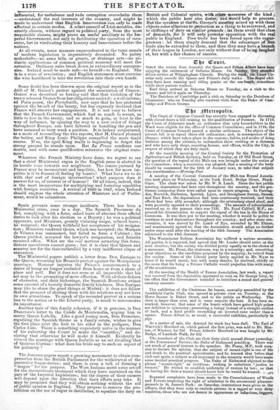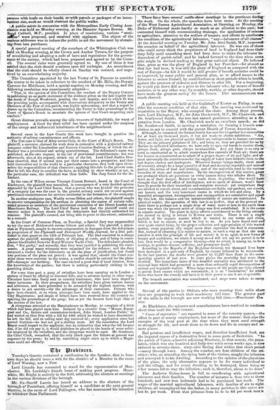lEbt filttropotis.
The Court of Common Council has recently been engaged in discussing with closed doors a bill relating to the qualification of freemen. In 1710, the Court of Aldermen made an ordinance that only householders in the Ward were eligible for the office of Common Councilmen; and in 1716, the Court of Common Council passed a similar ordinance. The object of the present bill is to repeal those old ordinances; and, in consequence of the changes which have taken place in the customs, habits, and modes of doing business among the citizens, to enfranchise those residing at a distance, and who have only shops, counting-houses, and offices, within the City, in respect of which they are duly rated.
At the monthly meeting of the Central Society for the Protection of Agriculture and British Industry, held on Tuesday, at 17 Old Bond Stree the question of the repeal of the Malt-tax was brought under the notice of the Committee; when a resolution was adopted, that a meeting of the body should be summoned for the 12th of January next, to take that subject into consideration.—Moraing Post.
A meeting of the Central Committee of the Malt-tax Repeal Associa- tion took place on Wednesday, at the York Hotel, Bridge Street, Black- friars. The chair was taken by Mr. W. B. Lamb. Since the last public meeting, deputations had been sent throughout the country, and the gen- tlemen composing them were called upon to report progress. In Farring- don, Norwich, Harleston, Ipswich, Lynn, and throughout Surrey, Susses, and East Kent, the deputations had been courteously received, and their efforts had been ably seconded; although the aristocracy stood aloof, and were generally opposed to their proceedings. The amount of subscriptions received up to the present time was 7131. Mr. Bond Cabbell, M.P., ex- pressed his determination to support the repeal of the tax in the House of Commons. It was then put to the meeting, whether it would be politic to continue to send deputations throughout the country; and after some con- versation, it was moved by Dr. Lamb of Rye, seconded by Mr. Elman, and unanimously agreed to, that the Association should adopt no further active steps until after the meeting of the 12th January. The Association- adjourned to.the 13th January.
The Westminster Reform Association has suffered a serious secession. All parties, it is reported, had agreed that Mr. Leader should retire at the next election-' but the society was divided pretty equally as to the choice of a successor. Mr. Prout, the chairman, was in a-minority; and, conceiving great objections to the candidate proposed by the majority, he retired from the society. Some of the Liberal party lately applied to Mr. Wyse to. know if be would stand; but, with many thanks, be declined, chiefly on the score that his being a Roman Catholic would prejudice him with many of the constituents.
At the meeting of the Health of Towns Association, last week, a report was received from the deputation appointed to wait on Sir George Grey, to the effect that the Government intended to introduce a sound and general sanatory measure.
The exhibition of the Christmas fat beasts, annually assembled by the Smithfield Cattle Club, was opened to private view on Tuesday, at the Horse Bazaar in Baker Street, and to the public on Wednesday. The show is larger than ever, and in some respects the best. It has been re- marked, however, that some of the beasts which have gained high prizes are deficient in symmetry; presenting a lumpy instead of a straight outline of back, and a hind profile resembling an inverted cone rather than a square. Prince Albert is, as usual, a successful exhibiter, particularly in pigs.
As a matter of sale, the demand for stock has been dull. The Earl of Warwick's Hereford ox, which gained the first prize, was sold to Mr. Men- ton, of Windsor, for 701. Prince Albert's Hereford ox was bought by Mr. Budge, of Lambeth Walk, for 551.
The members of the Club ate their forty-sixth annual dinner yesterday, at the Freemasons' Tavern; the Duke of Richmond presiding. There was not much of general interest in the speeches. Mr. Pusey, M.P., took occa- sion to declare his opinion, that the subject of tenant-right is one of life and death to the practical agriculturist; and he trusted that before that club met again, a subject so akimportant to the tenantry would have made some decided practical progress. The Duke of Richmond objected to the phrase "tenant-right" as invidious; wishing to substitute "justice to tenants." He wished to establish uniformity of custom by law; so that on leaving his farm a tenant should know how he would be treated. 4 4r1 Repeated complaints have been made to the Commissioners of Woods and Forests respecting the right of admission to the ornamental pleasure- grounds in St. James's Park: on Saturday, instructions were given to the officers, that they were only to exclude persons in a ragged or very dirty condition, those who are not decent in appearance or behaviour, beggars,
persons with loads on their heads, or with parcels or packages of an incon- venient size, such as would obstruct the public walks.
A public soiree in connexion with the Metropolitan Early Closing Asso- ciation was held on Monday evening, at the Hanover Square Rooms. Mr. Bo lid Cabbell, M.P., presided. In place of resolutions, various " senti- tunas" were proposed, and received with applause. The object of the various addresses was to induce the public to aid the movement by abstain- ing from late purchases.
A special general meeting of the members of the Whittington Club was held on Monday evening, at the Crown and Anchor Tavern, for the purpose of considering and adopting a code of laws and regulations for the govern- ment Of the society, which had been prepared and agreed to by the Coun- cil. The several rules were generally agreed to. By one of them it was settled that the club should continue open till midnight. An amendment that the club should be wholly closed on Sunday was resisted, and nega- tived by an overwhelming majority.
The Committee appointed by the last Vestry of St. Pancras to consider tie course to be taken in reference to the conduct of Mr. Mills, the Deputy Coroner for Middlesex, held a special meeting on Monday evening, and the following resolution was unanimously adopted-
" That, in the opinion of this Committee, the conduct of the Deputy Coroner in publishing an ex parte statement of the evidence given on the late inquiry into the death of Joseph Woodward, pending the said inquiry, and in which he was the presiding judge, accompanied with observations derogatory to the Vestry and Directors of the Poor of this parish, was highly unbecoming; and that a report be drawn up by the Committee, recommending the Vestry to take proceedings in the Court of Queen's Bench to ascertain the opinion of that Court respecting such conduct."
Great distress prevails among the silk-weavers of Spitslfields, for want of employmeut. A fund for their relief has been opened under the auspices of the clergy and influential inhabitants of the neighbourhood.
Several cases in the Law Courts this week have brought in question the authority of railway committeemen and officers.
,The first case is that of Alley versus Gain, in the Court of King's Bench. The plaintiff, a surveyor, claimed for work done in connexion with a projected railway company called the Lincolnshire and Eastern Counties Railway, of which the de- fendant was a provisional and acting committeeman. The defendant's name was published, at his own request, in the list of provisional committeemen; but was afterwards, also at his request, struck out of the list. Lord Chief Justice Den- man observed, that if several men put their names into a prospectus, and thus held themselves out to the world in a particular character, they took upon them- selves the responsibilities of that character; applying this rule to the present case. But he left the Jury to consider the facts, as tending to show whether or not, in the particular case, the defendant was thus liable. The Jury found for the de- fendant.
In the case of Wilson versus Viscount Curzon Stewart, heard in the Court of Exchequer, the plaintiff was nonsuited, in consequence of a very decided opinion expressed by the Lord Chief Baron' that a person who was himself the promoter of a company (as was the case in the present action) could not recover against provisional committeemen for services incidental to the formation of the company.
In another analogous case, Waddy versus Dillon and others, the plaintiff sought tarecover compensation for his services in obtaining the names of certain influ- ential persons as members of the provisional committee of the Direct London and Manchester Railway. The Lord Chief Baron held that the plaintiff could not recover unless it were shown that the defendants had directly authorized his retainer. The plaintiff's counsel, not being able to prove to this extent, submitted to a nonsnit.
In the Court of Common Pleas, on Tuesday, a Special Jury was empanelled to try the case of Holdsworth versus Gibson and others. The plaintiff, a physi- cian at Plymouth, sought to recover compensation in damages from the defendants as proprietors of the Plymouth and Devonport Weekly Journal, for a libel pub- lished in that paper on the 12th of February last. The libel consisted in a charge against the ydaintiff, amongst others, of cheating at cards, and of being in conse- quence blackballed from the Royal Western Yacht Club. The defendants pleaded, first, "Not guilty," and secondly, that they were justified in publishing the state- ments. A great many witnesses were examined for the defence; and the Jury returned a verdict for the defendants on all the pleas of justification, but found two portions of the pleas not proved: it was agreed that, should the Court con- sider those were material to the issues, a verdict should be entered for the plain- tiff—damages one farthing. The case excited a good deal of local interest, from the knowledge of the parties; but there is nothiug particularly striking in the gambling details.
For some time part a gang of swindlers have been carrying on in London a system of fraud by offering to discount bills, and to advance money in other ways. Circulars have been freely sent to country tradesmen, who have been duped in many instances. In their prospectuses, the swindlers have given various names and addresses, and have pretended to be actuated by the highest motives, with a -desire to act secretly—for the advantage of their customers. Persons who have been cheated, or on whom attempts have been made, have applied to the City Magistrates- and shoals of letters have been received from the country re- specting the proceedings of the gang; but as yet the knaves have kept clear of the meshes of the law.
A clergyman attended at the Mansionhouse on Monday, to complain of a trick which had been played upon him. Induced by a circular from "Messrs. Bonn- quet and Co., factors and commission-brokers, John Street, London Fields," be had waited on that firm with a bill for 1001. which he wished to have discounted: he left the bill, and on calling next day received 51.; every application since had proved fruitless—he had not got a shilling more. All the consolation the Lord Mayor could impart to the applicant, was an intimation that when the bill became due, if he did not pay it, it would doubtless be placed in the hands of some solici- tor employed by the swindlers, and the clergyman would be sued. Mr. Goodman, the Chief Cleric, remarked, that the only check upon the fellows at present was exposure by the press: by and by, something might start up in which a Magis- trate could act officially.



























 Previous page
Previous page